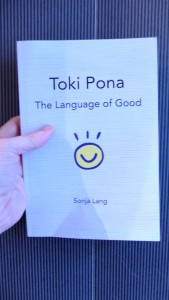This lesson plan is about invented languages, which as a teacher and a language learner I find endlessly fascinating. The YouTube video is an excerpt from ‘The Universal Language‘, a short, inspiring documentary on Esperanto. I liked it so much I even bought the full film; you can buy it too.
Esperanto is interesting because as there are (virtually) no native speakers the power dynamic of native vs non-native disappears – everyone is a learner. This makes Esperanto probably the most democratic language in existence and may explain the fervour and idealism which drives Esperantists. Interestingly, many learners of Esperanto are also auto-didacts – they don’t go to a classroom to learn the language; they learn themselves then find someone to talk to!
the power dynamic of native vs non-native disappears – everyone is a learner.
It’s this idealism behind Esperanto that I find so intriguing, and one which Arika Okrent explores in her book ‘In the Land of Invented Languages‘. To anyone with even a passing interest in languages this book is a must as it’s a testimony to the many cranks, loveable eccentrics and fruity ideas that surround the theory and practice of inventing languages. I enjoyed it so much I didn’t want it to end!
One of many highlights in the book is the chapter exploring the Whorf-Sapir hypothesis (that languages somehow ‘shapes’ our reality). 
Benjamin Whorf (an amateur linguist) studied the Native American Hopi language and found that in their language, the word ‘day’ wasn’t pluralised. That is, for the Hopi, a ‘day’ is something that can only be experienced one at a time – therefore it cannot be in the plural.
This led him to conclude that as the Hopi have a different concept of time, they experience time differently. This is a radical idea – that instead of us ‘thinking through language’, language ‘thinks through us’!
Arika is also, apparently, a speaker of Klingon.
This idea of language determining thought also leads us to today’s lesson free plan. Sonja Lang, who created Toki Pona, was struggling with a bout of depression and wanted to create a language to simplify her thoughts. Now there are several hundred speakers of Toki Pona, web groups, meetups and a book explaining the language. Here’s my copy!
In the book, which is beautifully written and illustrated, Sonja introduces her invented language by saying:
Modern languages are cluttered with complex ways to express the simplest things. What is a geologist but a ‘person of earth knowledge’? Is there any useful difference between the words ‘big’, ‘large’ and ‘huge’?
Toki Pona is a language that breaks down advanced ideas to their most basic elements…
Simplify your thoughts. Less is more.
Toki Pona uses 5 vowels, 9 consonants, 14 letters and only 120 words! Because of this, it’s easy to learn. As Sonja says in the book “If English is a thick novel, then Toki Pona is a haiku”. I was even thinking of organising a Toki Ponathon in Berlin, similar to the event organised in London by Memrise (if you’re interested, leave a comment).
Again, what I like about Toki Pona is the idealism of Sonja’s project, which for me chimes with the idealism of teaching as a profession, and teachers as idealistic people.
So, whether you’re an Esperantist, Klingonist, Toki Ponist or just plain old English speaker like me, I hope that you enjoy the lesson plan.
Finally, what’s your view on invented languages like Esperanto and Toki Pona?
A futile exercise, or a worthwhile peek into a more idealistic universe?
Mi tawa!
Images
Toki Pona logo, courtesy of Wikipedia. License: Creative Commons AttributionShareAlike 3.0.

